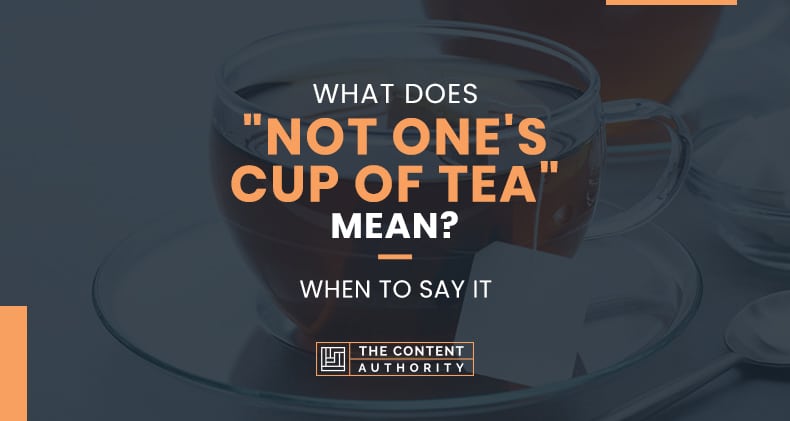Do you want to learn a language well? You have to learn more than words and sentences. If you’re going to learn a language, you must also know its popular expressions. With these phrases, we can understand the reality of a country and its culture. And often, the only way to use them well is by talking to the people around us.
“Not one’s cup of tea” is an expression that means that we don’t like something. Or that something doesn’t interest us. We also use it to say that something bores us or to refer to something we don’t enjoy or prefer. People use this phrase in many cases in a negative sense.
“Not one’s cup of tea is a phrase that in its literal sense says nothing about its meaning. So one way to understand it is to look for its origin, meaning, and other synonyms. In this article, we’ll learn how to use this phrase.
The Origin Of The Expression “Not One’s Cup Of Tea”

This expression is difficult to understand at first. If you hear it for the first time, you may not know what it refers to, let alone think of using it. Let’s see some theories about the origin of this phrase.
Origin Related To The Infusion Tea
For many people, tea is one of their favorite beverages. It is correct to say that tea is one of the world’s favorite beverages, almost as much water.
Tea also has many types and flavors to suit almost every taste: green tea, herbal tea, or ginger tea. But nobody can doubt that there are also people who do not like it. Thus, people believe tea represents events we prefer.
When something pleases us, we say, “is our cup of tea.” When something does not satisfy us, displeases us, or bores us, we say “is not our cup of tea.”
But what is the story behind the origin of this phrase? This version says that it may not be an ancient phrase. There is the possible first use of this phrase located in the 1930s.
“Not one’s cup of tea” appeared in February 1935 Syracuse Post Standard newspaper. The reporter used the term as we use it today.
The sentence read: “As Margie always says, ¨Saving energy is great, but taking the hassle out of window cleanin¨is my cup of tea¨.”
Origin In World War II

The idiom “cup of tea” became popular during World War II. It was the early 1900s when they used this phrase to say that we didn’t like something.
Then in the 1930s, its positive meaning increased. People used “Cup of tea” to say that you liked something as much or as good as your best friend.
In the 1940s, people created the opposite version of the phrase. People add the words “No one’s” to say that we don’t like something.
Nowadays, people use the negative version “no one’s cup of tea” more often than the upbeat version “cup of tea.”
British Origin Of “Not One’s Cup Of Tea”
Among the legends about this phrase is the one that claims that the English invented it. It is no secret that English tea is their favorite drink, so they see it as their best friend. That is why it is unlikely that tea means the same thing to Americans.
Because of this, they believe that the phrase “not one’s cup of tea” is more British than American. Moreover, for more than 250 years, there has been evidence of Americans’ poor taste in tea.
Comparison Of The Meanings Of “Not One’s Cup Of Tea” And “Cup Of Tea”

As we have already seen, the expression “Not one’s cup of tea” is an idiom that means the opposite, and that is “Cup of tea.” Let’s see the definitions of these expressions that are two sides of the same coin:
“Not One’s Cup Of Tea” (Negative Meaning)
- It’s something I don’t like
- It is something that a large group of people doesn’t like, such as some flavor, food, book.
- It is something that does not interest me at all.
- It is something I find boring.
“Cup Of Tea” (Positive Meaning)
- It is something I do like
- It is something that many people like
- It’s something that I prefer above other things.
- It’s something that gives me pleasure.
- It is something I would choose for myself.
A curious point between these expressions is that “Not one’s cup of tea” is the most used phrase out of the two.
What Words Could Be Synonyms For “Not One’s Cup Of Tea”?
Now understand the phrase. You can recognize words that mean the same or similar. Below we will review some of its synonyms.
Unpopular: someone who is not known or appreciated.
Unloved: someone who nobody likes.
Unfashionable: someone or something that is out of fashion or very old.
Unwanted: someone or something that no one wants.
Out of favor: someone who has fallen out of approval.
Aversive: a person who provokes rejection.
Be in bad odor with someone: to be in a critical mood with someone.
Which Words Can Be Antonyms Of “Not One’s Cup Of Tea”?
We will now do the opposite exercise. Let’s check words that mean the opposite of “Not one’s cup of tea.” Let’s get to know some of them.
Dear: a person who is very much loved.
Desirable: everyone desires that person
Wanted: is something or someone who is sought after by others.
Favorite: are things or people that we prefer.
Longed-for: is something we strongly wish.
To die for: is when we like something or someone so much that we would be able to pass away for it or make a great sacrifice.
Beloved: a loved person.
How People Use The Phrase “Not One’s Cup Of Tea”
It is gratifying to know that you have arrived at this point knowing a little more about this phrase. But we can’t allow even a slight doubt to remain about its varied uses in everyday life.
So let’s name some of how people use “Not one’s cup of tea.”
In Business Or School
- When someone says that business is not what they like to do
- To say when I don’t want to study a subject: maths, physics or chemistry
- When a person doesn’t wish to have an assignment at work
- To tell someone that they are not good at doing something at work
- When the boss tells you that you are not good at something at work
On A Personal Level
- To say that something bores us a lot
- To say that I don’t like a particular type of clothing
- When someone says they like a specific song or kind of music
- When we don’t want someone else
- To tell someone straight out that we don’t like them
- To say that not everybody wants a specific food recipe.
- To say that something, in particular, is not a person’s strong point
- When a person refuses to do something because he/she doesn’t like it
- To say that something is not part of my main interests
- To tell another person that he/she is not skilled at something
- When someone does not go to a party because he/she does not want to meet people, he/she does not like
In The Recreational Aspect
- To say that I don’t like a particular food
- To say that we don’t like a restaurant
- When I don’t want to go to a place
- When we don’t enjoy a sport or hobby
- To say that we don’t like dramatic scenes
- When a person refuses an invitation to a movie because he/she doesn’t like that kind of movie
- When someone doesn’t go to a party because they don’t want to meet people they don’t like
Some Examples Of The Phrase “Not one’s cup of tea” In Everyday Sentences
We enter the final stretch of this exciting journey to understand the phrase “Not one’s cup of tea.”
Now it only remains to show some concrete examples of the use of this valuable and popular expression.
- Visiting a museum and spending hours looking at paintings is not my cup of tea.
- The seafood preparation you made yesterday is not my cup of tea.
- Mary knows that accounting is not her cup of tea look at the errors that she made.
More English Idioms
A Final Thought On “Not One’s Cup Of Tea”
I hope this adventure we have had to learn a little more about the phrase “Not one’s cup of tea” has been valuable and fun. The important thing when learning a new idiom is to start using it.
Feel free to use this idiom whenever you want to talk about something you don’t prefer. You can also use it when something bores you.
In the beginning, it can be a little difficult to use new phrases. When you understand a contemporary idiom, you know the language a little bit more. And even if you don’t use it, now you know its meaning.
Shawn Manaher is the founder and CEO of The Content Authority. He’s one part content manager, one part writing ninja organizer, and two parts leader of top content creators. You don’t even want to know what he calls pancakes.

